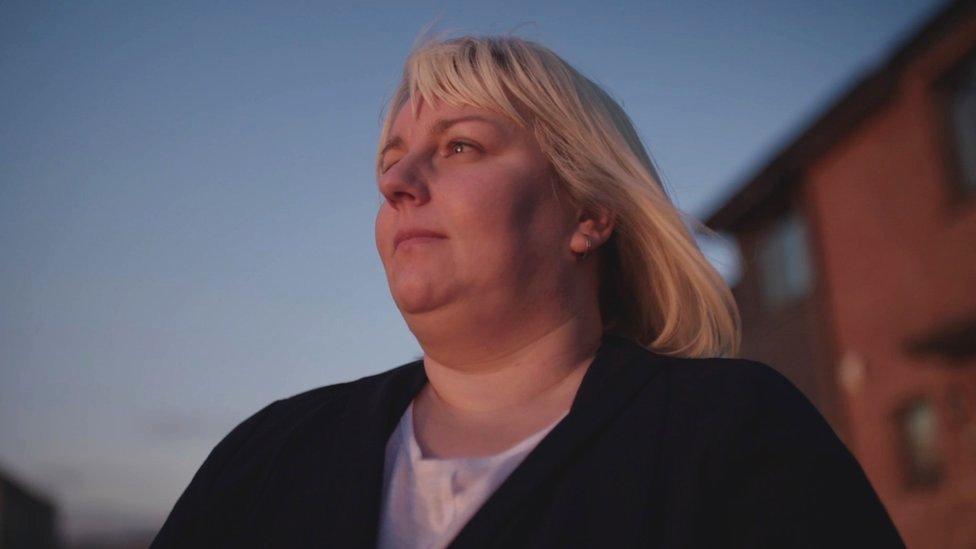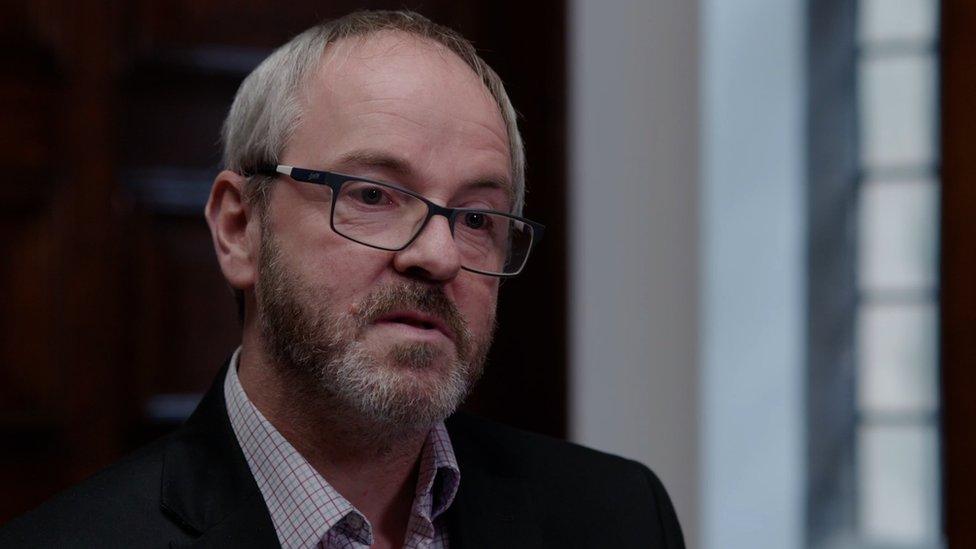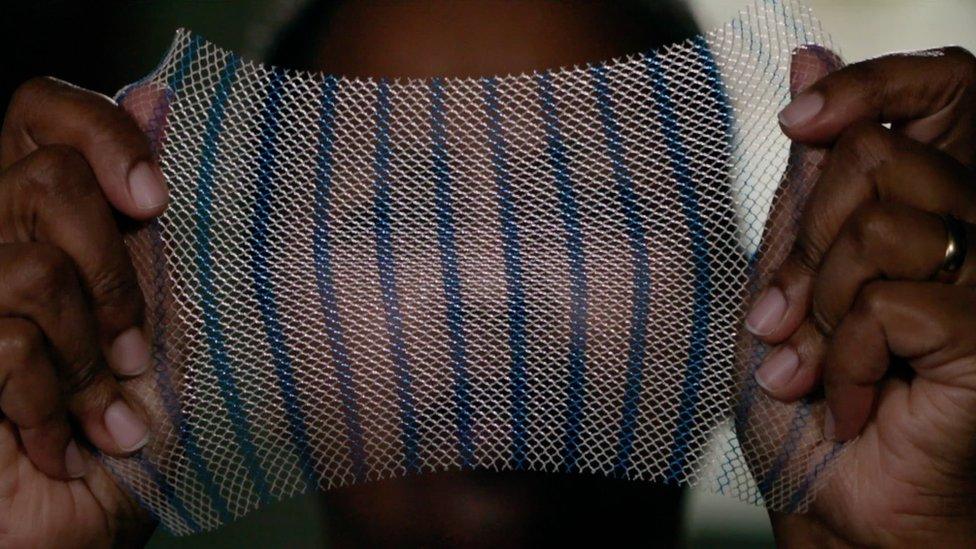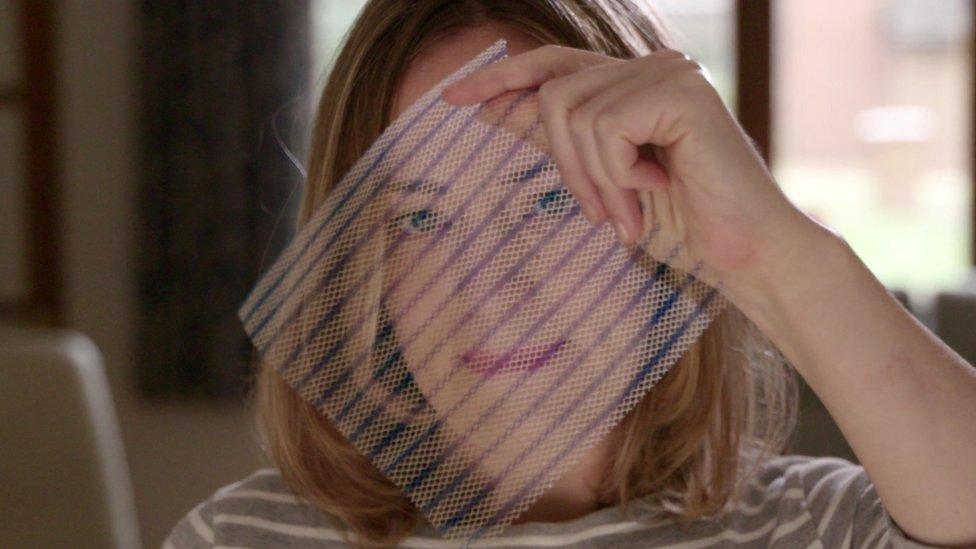Hernia mesh implants used 'with no clinical evidence'
- Published

Roseanna Clarkin is now registered as disabled, after complications following her hernia mesh repair
"Too many" types of hernia mesh implants are being used on NHS patients with little or no clinical evidence, the BBC has been told.
New data shows more than 100 different types of mesh were purchased by NHS Trusts from 2012 to 2018 in England and Scotland, leading to fears over safety.
The meshes can cut into tissue and nerves, leaving some people unable to walk, work or care for children.
The regulator MHRA said there was a clinical need for the devices.
The new figures were taken from the responses of 56 of the 159 NHS Trusts that replied to a Freedom of Information request by the BBC's Victoria Derbyshire programme.
Currently, hernia mesh devices can be approved if they are similar to older products, which themselves may not have been required to undergo any rigorous testing or clinical trials in order to assess their safety or efficacy.
'Children want their mum back'
Hernia repair is one of the world's most common surgical procedure.
In England, around 100,000 such operations are performed each year, the majority using mesh. Many go well.
But the Victoria Derbyshire programme has heard from nearly 300 people who have experienced complications - including chronic pain, infections and organ perforations.
International guidelines estimate one in 10 patients will experience "significant chronic pain" following a mesh repair.

Roseanna says her children want their "fun mum back"
Roseanna Clarkin, from Glasgow, is now disabled. She had to give up her job due to complications after her repair.
She says she was initially told by doctors the pain was "in her head", and wanted to end her life because "nobody was listening".
It was only after seeing the programme's coverage of the mesh scandal that she discovered it had been used on her.
Aged 36, she said she was no longer able to look after her children as she had before.
"My kids wrote a letter saying they want their fun mum back," she said, breaking down in tears.
"My husband said he married a wife and became a carer. I shouldn't be living the life I'm living."
'Tested on rabbits'
There is a lot of secrecy surrounding the approval of hernia mesh, with even doctors unable to access the clinical data.
Prof Carl Heneghan, a medical device expert at the University of Oxford, explained that in some cases devices have only been required to be tested on animals - such as rabbits - for a short period of time, with the mesh being implanted and left in for several days.
"If there's no remaining immune reaction, you pass the test," he added.

Prof Carl Heneghan is calling for the NHS to "immediately" stop using types of device that have "no evidence attached to them whatsoever"
Prof Heneghan described these tests as "completely inadequate" as they can't test for pain.
And he said there was "no chance" that the more than 100 types of device used on the NHS were all individually supported by medical evidence because there had not been 100 randomised trials in this area of medicine.
He has called for the NHS to "immediately" stop using those that have "no clinical evidence attached to them whatsoever" and said ideally trusts should only use two or three devices where the benefits are clear.

An example of the mesh devices used
Hernia mesh implants are meant to be permanent but, when necessary, can be removed in some patients.
But of the patients the Victoria Derbyshire programme spoke to, most said they had been told there were no trained removal surgeons - or that they had been told removing the mesh could lead to further serious issues.
The programme has learned that one man died years after he developed an infection following his hernia mesh repair.
The hospital said in a letter to his wife that the mesh "could have been a cause of the infection".
One of the many causes of death given was chronic abdominal-wall infection.
'Hard as stone'
The BBC has also seen a leaked promotional video, probably for the medical community, funded by Ethicon - one of the biggest mesh manufacturers in the world.
In the footage, made over a decade ago, a surgeon is shown discussing how some older varieties of mesh can become "hard as stone" after only one year inside a patient and can cause damage to the body and chronic pain.
But the product featured is still being sold by Ethicon, and used by the NHS in England and Scotland.
In a statement, Ethicon did not comment on the video, but said it stood by the safety and performance of all its mesh products.
It also stressed the importance of looking at all clinical and scientific data before drawing conclusions about a device.
'Monitor for evidence'
Currently the use of mesh for vaginal repairs is suspended for most women in England, pending the outcome of a government review.
Its head, Lady Cumberlege, has said any recommendations made when it is published in March will also be relevant for hernia mesh.
No vaginal mesh implants have been carried out in Scotland since the chief medical officer announced a halt in 2018.
The director of devices at the Medicines and Healthcare products Regulatory Agency (MHRA), Graeme Tunbridge, told the BBC: "The benefits and risks of using mesh for hernia repair have been considered in detail by clinicians and the professional bodies who represent them.
"We continue to monitor and review evidence as it becomes available and will take any appropriate action on that basis."
Mr Tunbridge said he recognised the system "does need strengthening" and said new legislation on medical devices would take effect from May 2020.
This will include strengthening the requirements on manufacturers to ensure that sufficient clinical evidence is in place for their products.
The Royal College of Surgeons of England said: "Our duty is to explain the options and risks to patients, so they can decide what the best course of action is for them."
It is campaigning to improve regulation and monitoring of new devices and implants.
A Department of Health and Social Care spokesperson said: "On the rare occasion where a patient has suffered as a result of a mesh procedure, we are taking steps to improve patient safety - including improving how we listen to patients and how the system learns when concerns are raised."

Follow the BBC's Victoria Derbyshire programme on Facebook, external and Twitter, external - and see more of our stories here.
- Published26 September 2018

- Published26 June 2017
